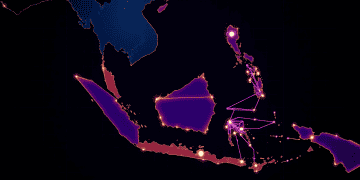The growth of the digital economy in Southeast Asia has elevated data protection as a key consideration for businesses and policymakers. The ASEAN-6—comprising Indonesia, Malaysia, the Philippines, Singapore, Thailand, and Vietnam—are strengthening their data protection frameworks to align with global standards while addressing regional needs. With the expansion of cross-border trade, e-commerce, and digital services, each country is implementing measures to secure personal data, protect user privacy, and enhance consumer confidence.
Indonesia
Indonesia introduced Law No. 27 of 2022 on Personal Data Protection (PDP Law) in October 2022, consolidating previous regulations into a unified framework influenced by the European Union’s General Data Protection Regulation (GDPR). The law defines personal data as information identifying an individual, directly or indirectly, and classifies it into General Personal Data and Specific Personal Data.
Key stakeholders include:
- Personal Data Subjects: Individuals whose data is being processed.
- Personal Data Controllers: Entities responsible for determining data processing purposes and methods.
- Personal Data Processors: Parties processing data on behalf of controllers.
- Data Protection Officers (DPOs): Individuals overseeing data protection compliance.
Rights granted to individuals under the PDP Law include access to their data, rectification of inaccuracies, data portability, and the right to request erasure. Non-compliance can result in administrative sanctions, including fines of up to 2% of annual revenue, and criminal penalties such as imprisonment or financial penalties reaching six billion rupiah (approximately US$400,000).
Malaysia
Malaysia has strengthened its data protection framework through amendments to the Personal Data Protection Act (PDPA), introducing new compliance requirements for businesses.
Key updates include:
- Mandatory appointment of DPOs: Organizations must designate a DPO to oversee data protection compliance.
- Expanded responsibilities for data processors: Compliance obligations now extend beyond data controllers to processors, with penalties for non-compliance reaching 1 million ringgit (US$232,000) and/or three years of imprisonment.
- Revised cross-border data transfer rules: The previous “white-list” system has been replaced, requiring businesses to implement contractual safeguards for international data transfers.
- Mandatory data breach notifications: Organizations must report breaches within specified timeframes, with penalties for non-compliance.
Philippines
The Data Privacy Act of 2012 (Republic Act No. 10173) governs personal data protection in the Philippines. The National Privacy Commission (NPC) ensures compliance with international standards and issues relevant guidelines. The law applies to both private and public sector entities processing personal data of Filipino citizens.
Key provisions include:
- Individual rights: Access to personal data, objection to processing, data portability, and request for erasure.
- Compliance principles: Organizations must follow transparency, legitimate purpose, and proportionality in data processing.
- Recent updates: New security requirements introduced through NPC Circular 2023-06 aim to strengthen data protection practices.
Non-compliance can result in fines and imprisonment for offenses such as unauthorized data processing and disclosure.
Singapore
Singapore’s Personal Data Protection Act (PDPA), first enacted in 2012 and updated in 2020, regulates the collection, use, and disclosure of personal data.
Key obligations include:
- Appointment of a DPO: Organizations must designate a DPO to ensure compliance.
- Consent and notification: Data subjects must be informed of data collection purposes and provide consent.
- Data breach notification: Significant breaches must be reported to authorities.
- Retention and transfer limits: Data should not be kept longer than necessary, and international transfers require adequate protection measures.
Non-compliance can result in fines up to S$1 million. The PDPA also includes a Do Not Call (DNC) Registry for telemarketing opt-outs.
Thailand
Thailand’s Personal Data Protection Act (PDPA), fully implemented in 2022, applies to entities processing personal data related to individuals in Thailand, regardless of location.
Key requirements include:
- Consent for data processing: Explicit consent is required, with exceptions.
- Data subject rights: Individuals have rights to access, rectify, and erase their data.
- Data breach notification: Organizations must report significant breaches.
Recent regulatory updates include sector-specific rules and increased enforcement activities. Non-compliance can result in fines up to 5 million baht (US$146,820) and punitive damages.
Vietnam
Vietnam’s data protection framework has evolved with the introduction of the Personal Data Protection Decree (Decree No. 13/2023/ND-CP) in 2023. The decree establishes principles such as lawfulness, transparency, and data minimization.
Ongoing regulatory developments include the Draft Law on Personal Data Protection, expected to take effect in 2026. Key updates include:
- Stronger requirements for DPOs: Organizations must appoint qualified personnel with expertise in data protection.
- Expanded definition of sensitive data: Now includes land ownership information.
- New oversight roles: Establishment of Personal Data Protection Organizations and Credit Rating Organizations to enhance compliance monitoring.
- Mandatory breach notifications: Incidents must be reported within 72 hours.
Considerations for Foreign Investors
Foreign investors operating in ASEAN-6 markets should prioritize compliance with local data protection laws to mitigate risks and maintain trust. Key measures include:
- Regular audits: Assess data handling practices and update policies accordingly.
- Contractual safeguards: Ensure agreements with third-party processors meet local compliance standards.
- Cross-border data transfer measures: Implement binding corporate rules or contractual clauses.
- Regulatory monitoring: Stay informed on evolving regulations, such as Vietnam’s upcoming data protection law.
Engaging local legal experts and adopting proactive data protection strategies will support compliance and business continuity in these dynamic markets.
Stay updated with supply chain logistics news on The Supply Chain Report. Free international trade tools are available at ADAMftd.com.
#ASEANDataProtection #ForeignInvestmentLaws #ASEANPrivacyRegulations #DataComplianceASEAN #CrossBorderDataLaws #InvestorGuideASEAN #ASEAN6CyberLaws















